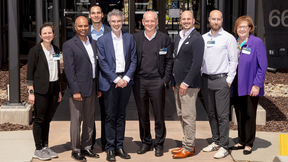Back
ASC
El Capitan reigns supreme across three major supercomputing benchmarks
Lawrence Livermore National Laboratory’s (LLNL) flagship exascale machine El Capitan maintained its status as the fastest supercomputer on the planet — claiming the No. 1 spot on not just one, but three of the most prestigious high-performance computing (HPC) rankings. In the 65th edition of the TOP500 List, released June 10 at the ISC High Performance conference in…
DOE Secretary Wright gets up-close look at innovation in action during LLNL visit
U.S. Department of Energy (DOE) Secretary Chris Wright visited Lawrence Livermore National Laboratory (LLNL) on May 28, experiencing firsthand the cutting-edge science and technology that power the Lab’s mission to protect the nation and advance the frontiers of discovery. Hosted by Lab Director Kim Budil, Wright’s day-long visit — his first to LLNL since being appointed…
Big Ideas Lab podcast examines how AI Is reshaping science at LLNL
As the world moves from the Information Age to the Data Age, AI is not only revolutionizing society — it’s fundamentally transforming how researchers at Lawrence Livermore National Laboratory (LLNL) approach science. On the latest episode of The Big Ideas Lab podcast, listeners will get an inside look at this transformation, as LLNL physicists Brian Spears and Kelli…
Simulating hot-spot formation in insensitive high explosives
When high explosives are subjected to sudden shock waves, such as from an impact or detonation, tiny regions of intense heat — called hot spots — form at microstructural defects such as pores. These hot spots play a critical role in determining whether the explosive will initiate and fully detonate. Understanding how hot spots form and behave across length scales is key to…
LLNL scientists use AI to optimize antibodies against mutations and accelerate pandemic preparedness
Researchers from Lawrence Livermore National Laboratory (LLNL), in collaboration with other leading institutions, have successfully used an AI-driven platform to preemptively optimize an antibody to neutralize a broad diversity of SARS-CoV-2 variants. This pioneering approach, published in the journal Science Advances, represents a significant leap in the fight against…
LLNL to examine exoplanet atmospheres with high-performance computing
The NASA/ESA/CSA James Webb Space Telescope (JWST) is the largest, most powerful and most complex telescope ever launched into space. Three years into its operations, JWST is revolutionizing our understanding of planets beyond our own solar system by collecting rich datasets on the atmospheres of these far-away worlds. However, data alone is not enough to understand our…
LLNL dedicates El Capitan, ushering in new era in supercomputing for national security
More than 300 Lawrence Livermore National Laboratory (LLNL) employees, government officials and industry leaders gathered at LLNL on Jan. 9 to celebrate the dedication of El Capitan, the world’s fastest supercomputer. The event marked a monumental achievement with the acceptance and deployment of the first exascale computing system built for the National Nuclear Security…
A look back at SC24: El Capitan crowned as LLNL’s legacy of supercomputing leadership reaches new heights
SC24, held recently in Atlanta, was a landmark event, setting new records and demonstrating Lawrence Livermore National Laboratory’s (LLNL) unparalleled contributions to high-performance computing (HPC) innovation and impact. SC, the International Conference for High Performance Computing, Networking, Storage and Analysis, is the biggest supercomputing event of the year…
Data Days workshop gathers DOE national labs to discuss future of data management
Lawrence Livermore National Laboratory (LLNL) recently hosted the 5th annual Department of Energy (DOE) Data Days event, bringing together data scientists, researchers and policymakers for three days of discussion on the latest advancements in data management, AI and high-performance computing (HPC). Drawing more than 300 attendees, this year’s “D3” workshop focused on…
LLNL teams win two HPCwire awards at SC24
Two teams led by Lawrence Livermore National Laboratory (LLNL) computer scientists won Editor’s Awards from HPCwire, a leading high-performance computing industry publication, at the 2024 Supercomputing Conference (SC24) in Atlanta. Researchers at LLNL, Los Alamos National Laboratory, Sandia National Laboratories and Cerebras Systems took home the publication’s award for…
Big Ideas Lab introduces El Capitan, the world’s most powerful supercomputer
On the newest episode of the Big Ideas Lab podcast, listeners will go behind the scenes of Lawrence Livermore National Laboratory’s (LLNL) latest groundbreaking achievement: El Capitan, the world’s most powerful supercomputer. Listen on Apple or Spotify. Built by Hewlett Packard Enterprise (HPE) with AMD’s new Instinct MI300A Accelerated Processing Units (APUs), El Capitan…
Lawrence Livermore National Laboratory’s El Capitan verified as world's fastest supercomputer
Lawrence Livermore National Laboratory (LLNL), in collaboration with the National Nuclear Security Administration (NNSA), Hewlett Packard Enterprise (HPE) and AMD, have officially unveiled El Capitan as the world's most powerful supercomputer and first exascale system dedicated to national security. Verified at 1.742 exaFLOPs (1.742 quintillion calculations per second) on…
‘Big Ideas Lab’ looks how DYNA3D has served as a workhorse for American industry for nearly 50 years
An iconic Lawrence Livermore National Laboratory (LLNL) computer code that has saved the automobile industry billions of dollars is the focus for the newest episode of the Big Ideas Lab Podcast. Listen on Apple or Spotify. Nearly 50 years ago in 1976, a then-LLNL mechanical engineer named John Hallquist wrote a small, 5,000-line program known as DYNA3D to help…
Breaking the ICE: ICECap looks to use exascale fusion simulations to pioneer digital design
A groundbreaking multidisciplinary team of Lawrence Livermore National Laboratory (LLNL) researchers is combining the power of exascale computing with AI, advanced workflows and graphics processor (GPU)-acceleration to advance scientific innovation and revolutionize digital design. The project, called ICECap (Inertial Confinement on El Capitan), is a transformative…
Evaluating trust and safety of large language models
Amid the skyrocketing popularity of large language models (LLMs), researchers at Lawrence Livermore National Laboratory are taking a closer look at how these artificial intelligence (AI) systems perform under measurable scrutiny. LLMs are generative AI tools trained on massive amounts of data in order to produce a text-based response to a query. This technology has the…
Machine learning optimizes high-power laser experiments
Commercial fusion energy plants and advanced compact radiation sources may rely on high-intensity high-repetition rate lasers, capable of firing multiple times per second, but humans could be a limiting factor in reacting to changes at these shot rates. Applying advanced computing to this problem, a team of international scientists from Lawrence Livermore National…
Manufacturing optimized designs for high explosives
When materials are subjected to extreme environments, they face the risk of mixing together. This mixing may result in hydrodynamic instabilities, yielding undesirable side effects. Such instabilities present a grand challenge across multiple disciplines, especially in astrophysics, combustion and shaped charges — a device used to focus the energy of a detonating explosive…
LLNL’s El Capitan debuted on new Top500 list of world’s most powerful supercomputers
Three new systems currently or soon-to-be sited at Lawrence Livermore National Laboratory (LLNL) on Monday debuted on the latest Top500 list of most powerful supercomputers in the world, including the first portion of the exascale machine El Capitan. Unveiled at the International Supercomputing Conference in Hamburg, Germany, the June 2024 Top500 lists three systems with…
GUIDE team develops approach to redesign antibodies against viral pandemics
In a groundbreaking development for addressing future viral pandemics, a multi-institutional team involving Lawrence Livermore National Laboratory (LLNL) researchers has successfully combined an artificial intelligence (AI)-backed platform with supercomputing to redesign and restore the effectiveness of antibodies whose ability to fight viruses has been compromised by…
University of California/LLNL joint workshop sparks crucial dialogue on AI safety
Representatives from the Department of Energy (DOE) national laboratories, academia and industry convened recently at the University of California Livermore Collaboration Center (UCLCC) for a workshop aimed at aligning strategies for ensuring safe artificial intelligence (AI). The daylong event, attended by dozens of AI researchers, included keynote speeches by thought…

























